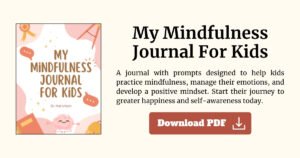Why You Should Teach Mindfulness to Teenagers
 Teach mindfulness to teenagers focuses on the cultivation of kindness towards your self and the difference it has on your life. Mindfulness and compassion together (we call it Kindfulness) are proven in the latest scientific research to be the best way to optimize your body and mind for a happier, healthier you and a better world for all.
Teach mindfulness to teenagers focuses on the cultivation of kindness towards your self and the difference it has on your life. Mindfulness and compassion together (we call it Kindfulness) are proven in the latest scientific research to be the best way to optimize your body and mind for a happier, healthier you and a better world for all.
What goes on in a teen’s head? We can dare say, a lot, yes? From managing school, maintaining social relationships, to trying to realize what they really want to do when they graduate, plus the pressures of social media. Plus, teens have yet so much to learn, to adjust to novel challenges and they are not that “equipped” yet emotionally and psychologically. And so, despite what we think that they have got it easy as compared to us adults, teens do get stressed. Others go through anxiety and depression. And this is the reason why we don’t ever want to assume that whatever they’re going through, they can always handle it.
Thankfully, as Positive Psychology courses and research (and mental health awareness events) are slowly becoming more prevalent, we are continuously looking for ways and strategies to help teens calm their minds, become more present, and deal with issues a whole lot better.
Cue in Mindfulness for teens.
Before you continue you might like to consider our free worksheet on exploring “My Mindfulness Journal For Kids”. Please download this worksheet here.
Mindfulness Definition
Mindfulness according to the American Psychological Association (2012) is “…a moment-to-moment awareness of one’s experience without judgment. In this sense, mindfulness is a state and not a trait. While it might be promoted by certain practices or activities, such as meditation, it is not equivalent to or synonymous with them.”
The benefits of regularly practicing mindfulness, however, are worth it.
Mindfulness Benefits
With a long list of benefits that mindfulness has been known for based on scientific studies, let’s cover a few that relate to youth and teens.
Reduces Stress
One of the benefits of mindfulness that is highly known for is reducing stress, as mentioned in several studies. According to Remmers, Topolinski & Koole (2016), mindfulness can help improve ability to manage stress and better emotional regulation.
In the “Little Book of Mindfulness”, Rebecca Howden and Medibank listed benefits of mindfulness due to one being in a state of relaxation. This includes increased immune function, higher brain functioning, increased perception and clarity in thinking, lower heart rate and blood pressure, and feeling calmer and more connected.
Decreases Depressive Symptoms
Another mindfulness benefit worth noting is it decreases symptoms of depression as well as anxiety and stress, while increasing self-compassion in college students (Falsafi, 2016).
In Costa and Barnhofer’s 2016 study, they found that mindfulness has helped participants who struggled with depression through emotion regulation.
 Help Achieve Academic Success
Help Achieve Academic Success
There have also been mindfulness studies that focus on students and one 2016 study concluded that elementary students who do mindfulness activities showed greater academic access, emotion regulation, and better prosocial behaviors (Harpin, Rossi, Kim, & Swanson).
In a 2013 study by Sibinga, Perry-Parrish, Chung, Johnson, Smith, & Ellen, they found that urban male youth who have experienced Mindfulness Based Stress Reduction (MBSR) have improved ability to handle academic stress plus they experience less anxiety.
Boosts Resilience
Children who went through mindfulness training online and in group classes have shown improved resilience and have better regulation of their own emotions and feelings (Coholic, Eys, & Lougheed, 2012). With resilience, children and teens have better chances of coping with daily struggles as well as developing psychologically, emotionally, and academically.
Improved Classroom Behavior
A study conducted in an elementary school of a 5-week mindfulness-based curriculum showed improvements on students resulting in teachers reporting improved classroom behavior which lasted 7 weeks after intervention. Changes in behavior include self-control, paying attention, respect for others, participation in activities, etc. (2010)
Better Coping Skills When Being Faced with Bullies
A 2017 study by Zhou, Liu, Niu, Sun, and Fan indicates that bullied children who practiced mindfulness showed fewer depressive symptoms.
Mindfulness Activities for Teens
Did you know that Mindfulness is not limited to meditation? Yes, there are other ways to practice mindfulness and here are some of the best mindfulness activities for teens:
Breathing Exercises
Spending just 5 minutes daily to focus on breathing helps center thoughts.
Mindful Walking
When doing mindful walking, focus on surroundings while walking outdoors. No listening to music on headphones while doing this mindfulness exercise.
Mindful Listening to Music
Find at least 10-15 minutes a day to just listen to music and notice how you feel and how your body reacts to it. No specific genre needed however, instrumental music would be highly recommended especially if you’re battling anger issues.
Mindful Coloring
First things first, look for a calm location for this mindfulness activity. You can use crayons, paint, or pastels to color. While you color, make sure to notice your breathing and the feelings that appear. Whenever your mind wanders off, try to refocus it on your breathing again.
Mindfulness Journal
Keeping a journal has been known to have many benefits, especially if one writes on it daily. One of the many benefits of journaling is promoting gratitude which then leads to contentment and happiness. For Mindful Journaling, teens can use journal prompts for them to know what to write about and thus help them to start reflecting and acknowledging their feelings.
Here are some examples of journal prompts:
What are you grateful for?
What motivates you the most?
Which fictional character do you relate to the most?
What scares you?
What was the hardest challenge that you ever had to face? How did you handle it?
When was the last time you helped someone?
What do you want to achieve in the next week? Next month? Next year?
What made you smile today?
What things cause you the most stress? How do you think you can change them?
What things do I look forward to every time I go to school?
What is your favorite personality trait?
What lesson did I learn this week?
Describe the best birthday you ever had.
What’s the nicest thing someone has ever done to you?
 Yoga
Yoga
Did you know that yoga is more than just holding poses and stretching? It’s actually a lifestyle and a practice and is focused on the inner experience rather than outer experience. It involves reflection and introspection as well as entering the “flow” where one becomes present in the moment. Due to this, yoga is one good activity that cultivates mindfulness. Plus, yoga is known for a plethora of benefits such as reducing fatigue, increasing balance, relieving pain, improving kidney function, promoting healthy heart rate, improving sleep, increasing strength, and reducing stress, among others.
Teach mindfulness to teenagers course to be both an informative and fun learning environment. There are other awesome mindfulness activities that teens can try to start practicing: mindful eating, mindful bath, mindfulness dance, meditation training, and more. Now that we have established that mindfulness has profound effects on psychological and cognitive well-being, teaching teens to practice mindfulness will aid them to not only deal with their daily stresses growing up but to help them become more adaptive and resilient adults.
Are you ready to help teens navigate stress and become more mindful? Start by downloading our “Mindfulness Journal For Kids” worksheet and give them the tools they need to build resilience, focus, and well-being today.






